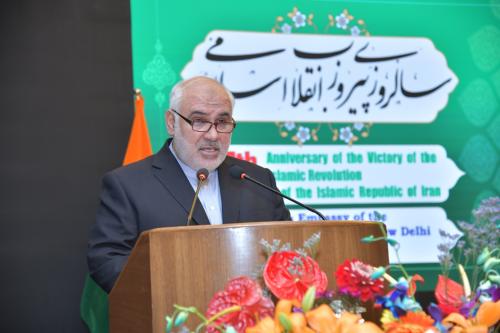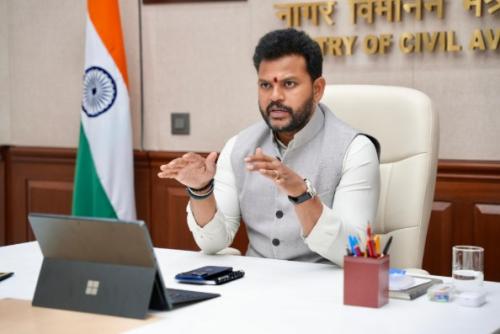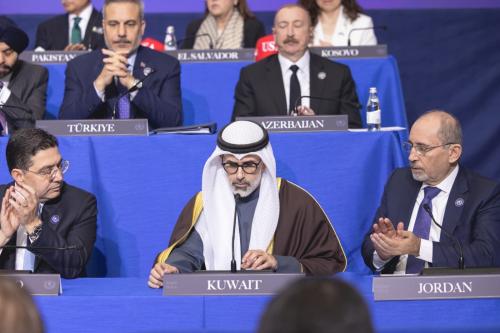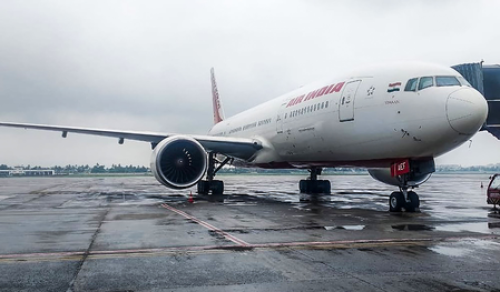New Delhi, February 1 (ANI): With a thrust on better logistics and infrastructure, ease of doing business and inclusive development, the Union Budget 2023-24 presented by Finance Minister Nirmala Sitharaman in Parliament on Wednesday sought to lay out the vision for Amrit Kaal and contained several new initiatives cutting across sectors. Sitharaman noted that the world has recognised the Indian economy as a 'bright star' which is expected to grow in the current year at seven per cent - the highest among all the major economies. She outlined seven priorities to act as "Saptrishi" to guide vision during Amrit Kaal, the 25-year-long period up to 2047 when India will celebrate the centenary of its independence. The vision for Amrit Kaal includes opportunities for citizens with focus on youth, growth and job creation and strong and stable , macro-environment. The budget, likely to be the last full budget of the Modi government in its present term, proposed changes in personal income tax aimed at the middle class and initiatives for various sections of society, specially the youth, farmers and women. The country will face general elections in 2024 and nine states will go to the polls this year. The budget proposed to increase capital investment outlay steeply for the third year in a row by 33 per cent to Rs 10 lakh crore, which would be 3.3 per cent of GDP. It proposes 66 per cent increase in outlay for PM Awas Yojana to over Rs 79,000 crore and the highest-ever capital outlay for Railways of Rs 2.40 lakh crore. The budget reflected that India's targets are on a scale that is expected to impact the world. It emphasized green growth. Finance Minister announced that over the next three years, the Centre will facilitate one crore farmers to adopt natural farming. She said Pradhan Mantri Kaushal Vikas Yojana 4.0 will be launched to skill lakhs of youth within the next three years. She said to skill youth for international opportunities, 30 Skill India International Centres will be set up across different states. The minister said the fiscal deficit is estimated to be 5.9 per cent of GDP. The indirect tax proposals contained in the budget aim to promote exports enhance domestic value addition, and encourage green energy and mobility. "Capital investment outlay is being increased steeply for the third year in a row by 33 per cent to Rs 10 lakh crore, which would be 3.3 per cent of GDP. This will be almost three times the outlay in 2019-20. This substantial increase in recent years is central to the government's efforts to enhance growth potential and job creation, crowd in private investments, and provide a cushion against global headwinds," Sitharaman said. India, which is now the world's fifth-largest economy of the world, is poised to grow at seven per cent this year despite of the massive global slowdown caused by COVID-19 and Russia-Ukraine War. Sitharaman said Indian economy is on the right track, and despite a time of challenges, heading towards a bright future. She said that the government's efforts since 2014 have ensured for all citizens a better quality of living and a life of dignity and the per capita income has more than doubled to Rs 1.97 lakh. She said priorities of government complement each other and 'Saptarishi' initiatives include Inclusive Development, Reaching the Last Mile, Infrastructure and Investment, Unleashing the Potential, Green Growth, Youth Power and Financial Sector. Sitharaman made five major announcements relating to the personal income tax. The rebate limit in the new tax regime has been increased to Rs 7 lakh, meaning that persons in the new tax regime with income upto this income will not have to pay any tax. The tax structure in the new personal tax regime has been changed by reducing number of slabs to five. The benefit of standard deduction has been extended to the salaried class and the pensioners including family pensioner under the new tax regime. Salaried individual will get standard deduction of Rs 50,000 and pensioner Rs 15,000 as per the proposal. Each salaried person with an income of Rs 15.5 lakh or more will thus gain Rs 52,500, from the above proposals. The highest surcharge rate in personal income tax has been reduced from 37 per cent to 25 per cent in the new tax regime for income above Rs 2 crore. This would result in the maximum tax rate of personal income tax come down to 39 per cent which was earlier 42.74 per cent. The limit of tax exemption on leave encashment on the retirement of non-government salaried employees has been increased from Rs 3 lakh to Rs 25 lakh. The new income tax regime has been made the default tax regime. However, the citizens will continue to have the option to avail the benefit of the old tax regime. Referring to agriculture and cooperation, the minister said that the Digital Public infrastructure for agriculture will be built as an open source, open standard and interoperable public good. She said this will enable inclusive, farmer-centric solutions through relevant information services for crop planning and health, improved access to farm inputs, credit, and insurance, help for crop estimation, market intelligence, and support for growth of agri-tech industry and start-ups. Sitharaman announced an Agriculture Accelerator Fund to encourage agri-startups by young entrepreneurs in rural areas, which will aim at bringing innovative and affordable solutions for challenges faced by farmers. It will also bring in modern technologies to transform agricultural practices, increase productivity and profitability. To enhance the productivity of extra-long staple cotton, Government will adopt a cluster-based and value chain approach through Public Private Partnerships (PPP). This will mean collaboration between farmers, state and industry for input supplies, extension services, and market linkages. She said the government will launch an Atmanirbhar Clean Plant Programme to boost availability of disease-free, quality planting material for high value horticultural crops at an outlay of Rs 2,200 crore. Referring to India being at the forefront of popularizing millets, the minister said India is the largest producer and second largest exporter of 'Shree Anna' in the world as it grows several types of 'Shree Anna' such as jowar, ragi, bajra, kuttu, ramdana, kangni, kutki, kodo, cheena, and sama. To make India a global hub for 'Shree Anna', the Indian Institute of Millet Research, Hyderabad will be supported as the Centre of Excellence for sharing best practices, research and technologies at the international level, the minister said. Dwelling on welfare measures for farmers, the Finance Minister announced that the agriculture credit target will be increased to Rs 20 lakh crore with focus on animal husbandry, dairy and fisheries. She informed that the Government will launch a new sub-scheme of PM Matsya Sampada Yojana with targeted investment of Rs 6,000 crore to further enable activities of fishermen, fish vendors, and micro and small enterprises, improve value chain efficiencies, and expand the market. For farmers, especially small and marginal farmers, and other marginalized sections, the government is promoting cooperative-based economic development model. A national cooperative database is being prepared for country-wide mapping of cooperative societies. Sitharaman said that Government will implement a plan to set up massive decentralized storage capacity, which will help farmers store their produce and realize remunerative prices through sale at appropriate times. The government will also facilitate setting up of a large number of multipurpose cooperative societies, primary fishery societies and dairy cooperative societies in uncovered panchayats and villages in the next five years. The Finance Minister announced that 157 new nursing colleges will be established in co-location with the existing 157 medical colleges established since 2014. She also informed that a Mission to eliminate Sickle Cell Anaemia by 2047 will be launched. On medical research, she said that facilities in select ICMR Labs will be made available for research by public and private medical college faculty and private sector R&D teams for encouraging collaborative research and innovation. Dwelling on pharma innovation, the Finance Minister informed that a new programme to promote research and innovation in pharmaceuticals will be taken up through centers of excellence. She said that the government will also encourage industry to invest in research and development in specific priority areas. She said teachers' training will be re-envisioned through innovative pedagogy, curriculum transaction, continuous professional development, dipstick surveys, and ICT implementation. She added that the District Institutes of Education and Training will be developed as vibrant institutes of excellence for this purpose. She also informed that a National Digital Library for Children and Adolescents will be set-up for facilitating availability of quality books across geographies, languages, genres and levels, and device agnostic accessibility. States will be encouraged to set up physical libraries for them at panchayat and ward levels and provide infrastructure for accessing the National Digital Library resources. Additionally, to build a culture of reading, and to make up for pandemic-time learning loss, the National Book Trust, Children's Book Trust and other sources will be encouraged to provide and replenish non-curricular titles in regional languages and English to these physical libraries. Sitharaman informed that building on the success of the Aspirational Districts Programme, the Government has recently launched the Aspirational Blocks Programme covering 500 blocks for saturation of essential government services across multiple domains such as health, nutrition, education, agriculture, water resources, financial inclusion, skill development, and basic infrastructure. The Finance Minister said that to improve socio-economic conditions of the particularly vulnerable tribal groups (PVTGs), Pradhan Mantri PVTG Development Mission will be launched. This will saturate PVTG families and habitations with basic facilities such as safe housing, clean drinking water and sanitation, improved access to education, health and nutrition, road and telecom connectivity, and sustainable livelihood opportunities. She said that in the next three years, centre will recruit 38,800 teachers and support staff for the 740 Eklavya Model Residential Schools, serving 3.5 lakh tribal students. Finance Minister said that in the drought prone central region of Karnataka, central assistance of Rs 5,300 crore will be given to Upper Bhadra Project to provide sustainable micro irrigation and filling up of surface tanks for drinking water. 'Bharat Shared Repository of Inscriptions' will be set up in a digital epigraphy museum, with digitization of one lakh ancient inscriptions in the first stage. Sitharaman said investments in Infrastructure and productive capacity have a large multiplier impact on growth and employment and the effective capital expenditure' of the Centre is budgeted at Rs 13.7 lakh crore, which will be 4.5 per cent of GDP. The Finance Minister informed that the Government has decided to continue the 50-year interest free loan to state governments for one more year to spur investment in infrastructure and to incentivize them for complementary policy actions, with a significantly enhanced outlay of Rs 1.3 lakh crore. The Finance Minister announced that a capital outlay of Rs 2.40 lakh crore has been provided for the Railways, which is the highest ever outlay and about 9 times the outlay made in 2013- 14. She also informed that 100 critical transport infrastructure projects, for last and first-mile connectivity for ports, coal, steel, fertilizer, and food grains sectors have been identified and they will be taken up on priority with investment of Rs 75,000 crore, including Rs 15,000 crore from private sources. Sitharaman said that 50 additional airports, heliports, water aerodromes and advance landing grounds will be revived for improving regional air connectivity. The Finance Minister announced that an Urban Infrastructure Development Fund (UIDF) will be established through use of priority sector lending shortfall, which will be managed by the National Housing Bank, and will be used by public agencies to create urban infrastructure in Tier 2 and Tier 3 cities. She said that States will be encouraged to leverage resources from the grants of the 15th Finance Commission, as well as existing schemes, to adopt appropriate user charges while accessing the UIDF. The Centre will make available Rs 10,000 crore per annum for this purpose. The Finance Minister said that for enhancing ease of doing business, more than 39,000 compliances have been reduced and more than 3,400 legal provisions have been decriminalized. She added that for furthering the trust-based governance, Government has introduced the Jan Vishwas Bill to amend 42 Central Acts. For realizing the vision of "Make A-I in India and Make A-I work for India", three centers of excellence for Artificial Intelligence will be set-up in top educational institutions. Referring to Pradhan Mantri Kaushal Vikas Yojana 4.0, she said on-job training, industry partnership, and alignment of courses with needs of industry will be emphasized. The scheme will also cover new age courses for Industry 4.0 like coding, AI, robotics, mechatronics, IOT, 3D printing, drones, and soft skills. To provide stipend support to 47 lakh youth in three years, Direct Benefit Transfer under a pan-India National Apprenticeship Promotion Scheme will be rolled out, the minister said. Leading industry players will partner in conducting interdisciplinary research, develop cutting-edge applications and scalable problem solutions in the areas of agriculture, health, and sustainable cities, which will galvanize an effective A-I ecosystem and nurture quality human resources in the field. The minister said that to unleash innovation and research by start-ups and academia, a National Data Governance Policy will be brought out, which will enable access to anonymized data. She also announced that an Entity DigiLocker will be set up for use by MSMEs, large business and charitable trusts for storing and sharing documents online securely, whenever needed, with various authorities, regulators, banks and other business entities. On 5G Services, she announced that 100 labs for developing applications using 5G services will be set up in engineering institutions to realize a new range of opportunities, business models, and employment potential. The labs will cover, among others, applications such as smart classrooms, precision farming, intelligent transport systems, and health care applications. Referring to green growth, Sitharaman said that Prime Minister has given a vision for "LiFE", or Lifestyle for Environment, to spur a movement of environmentally conscious lifestyle. India is moving forward firmly for the 'panchamrit' and net-zero carbon emission by 2070 to usher in green industrial and economic transition. The minister said the Budget builds on the focus on green growth. The recently launched National Green Hydrogen Mission, with an outlay of Rs 19,700 crores, will facilitate transition of the economy to low carbon intensity, reduce dependence on fossil fuel imports, and make the country assume technology and market leadership in this sunrise sector. The target is to reach an annual production of 5 MMT by 2030. The Budget also provides Rs 35,000 crore for priority capital investments towards energy transition and net zero objectives, and energy security by Ministry of Petroleum and Natural Gas. The Finance Minister said that to steer the economy on the sustainable development path, Battery Energy Storage Systems with capacity of 4,000 MWH will be supported with Viability Gap Funding. She also informed that the Inter-state transmission system for evacuation and grid integration of 13 GW renewable energy from Ladakh will be constructed with investment of Rs 20,700 crore including central support of Rs 8,300 crore. Sitharaman announced that 500 new 'waste to wealth' plants under GOBARdhan (Galvanizing Organic Bio-Agro Resources Dhan) scheme will be established for promoting circular economy. These will include 200 compressed biogas (CBG) plants, including 75 plants in urban areas, and 300 community or cluster-based plants at total investment of Rs 10,000 crore. She said, in due course, a 5 per cent CBG mandate will be introduced for all organizations marketing natural and bio gas and for collection of bio-mass and distribution of bio-manure, appropriate fiscal support will be provided. She said to facilitate one crore farmers to adopt natural farming, 10,000 Bio-Input Resource Centres will be set-up, creating a national-level distributed micro-fertilizer and pesticide manufacturing network. The Finance Minister said that in furtherance of the vehicle scrapping policy mentioned in Budget 2021-22, she has allocated adequate funds to scrap old vehicles of the Central Government and States will also be supported in replacing old vehicles and ambulances. The Finance Minister said that to empower the youth and help the 'Amrit Peedhi' realize their dreams, Government has formulated the National Education Policy, focused on skilling, adopted economic policies that facilitate job creation at scale, and have supported business opportunities. The Minister said that states will be encouraged to set up a Unity Mall in their state capital or most prominent tourism centre or the financial capital for promotion and sale of their own ODOPs (one district, one product), GI products and other handicraft products, and for providing space for such products of all other states. The Finance Minster said that last year she proposed revamping of the credit guarantee scheme for MSMEs and announced that the revamped scheme will take effect from April 1, 2023 through infusion of Rs 9,000 crore in the corpus. This will enable additional collateral-free guaranteed credit of Rs 2 lakh crore. Further, the cost of the credit will be reduced by about one per cent. Sitharaman said that a National Financial Information Registry will be set up to serve as the central repository of financial and ancillary information. This will facilitate efficient flow of credit, promote financial inclusion, and foster financial stability. A new legislative framework will govern this credit public infrastructure, and it will be designed in consultation with the RBI. She also announced that a Central Processing Centre will be setup for faster response to companies through centralized handling of various forms filed with field offices under the Companies Act. For commemorating Azadi Ka Amrit Mahotsav, a one-time new small savings scheme, Mahila Samman Savings Certificate, will be made available for a two-year period up to March 2025. This will offer deposit facility upto Rs 2 lakh in the name of women or girls for a tenor of two years at fixed interest rate of 7.5 per cent with partial withdrawal option. The Finance Minister announced that the maximum deposit limit for Senior Citizen Savings Scheme will be enhanced from Rs 15 lakh to Rs 30 lakh. Also, the maximum deposit limit for Monthly Income Account Scheme will be enhanced from Rs 4.5 lakh to Rs 9 lakh for single account and from Rs 9 lakh to Rs 15 lakh for joint account. Sitharaman said that the entire fifty-year loan to states has to be spent on capital expenditure within 2023-24. Most of this will be at the discretion of states, but a part will be conditional on states increasing their actual capital expenditure. The indirect tax proposals announced in the budget emphasized simplification of tax structure with fewer tax rates so as to help in reducing compliance burden and improving tax administration.
Union Budget 2023-24 presents vision for Amrit Kaal, proposes changes income tax slabs, steep hike in capital investment
- by Rinku
- February 01, 2023 2 minutes

Nirmala Sitharaman presents the Union Budget 2023-24
Beautiful beaches in India
February 03, 2023










